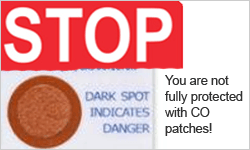The Dangers of Carbon Monoxide (CO)

CO can kill quickly without much warning!
Not only can you not see it, smell it or taste it but CO is poisonous and can kill quickly without much warning. Sadly, about 15 people in the UK each year die from carbon monoxide poisoning (HSE Statistics).
What is Carbon Monoxide and how is it produced?
Carbon monoxide gas is produced when carbon-based fuels including gas, petrol, lpg, coal, oil or wood are burnt without enough oxygen. This can happen when a gas appliance has been incorrectly fitted, badly repaired or poorly maintained. Other known causes of CO are blocked flues, chimneys or vents. It is therefore important to have your appliances regularly serviced and maintained (at least once a year) and ensure that chimneys are regularly swept.
Signs to look for:
Orange or yellow gas flames (normally gas flames are a bright blue).
Soot or yellow brown stains on and around appliances.
Pilot lights that frequently blow out.
Build up of condensation inside windows.
Slower than usual burning of solid-fuels fires.
Familiarise yourself with the main symptoms - it could save your life!
Headaches/dizziness
Tiredness
Breathlessness
Nausea
Collapse
Loss of unconsciousness
Pains in the chest/stomach
Erratic behavoiur
Visual problems
In fact, CO poisoning symptoms
are not disimilar to flu, food poisoning, viral infections, tiredness. The following signs may also be indicative of CO poisoning: symptoms only occur at home (conversely, symtoms disappear/improve when when leave the house), other family members are experiencing the same symptoms). The general public is also not acutely aware it seems that long term exposure to lower levels of CO gas can cause serious long term health effects including brain damage and paralysis.
Suspect a CO gas leak?
If so, please carry out the follwoing advice:
Open all doors and windows.
Turn off all gas applainces and leave the house straight away.
Seek medical advice immediately (visit your doctor or A&E Dept (you can request a bllod/breath test).
Call a Gas Safe registered gas engineer to have your applaince checked.
Phone the National Gas Emergency No on 0800 111 999
Buy a quality Honeywell CO detector that is approved to European standards
The Gas Safe Register recommends the purchase pof an audible CO alarm and not the "black spot" patches that "change colour" when CO is present as only an audible alarm will wake you up when you are sleeping - a time of day when you are particularly vulnerable to carbon monoxide poisoning!
One final reminder. Ensure that you have your gas appliance checked at least once a year. Never assume that your gass appliances are safe.
